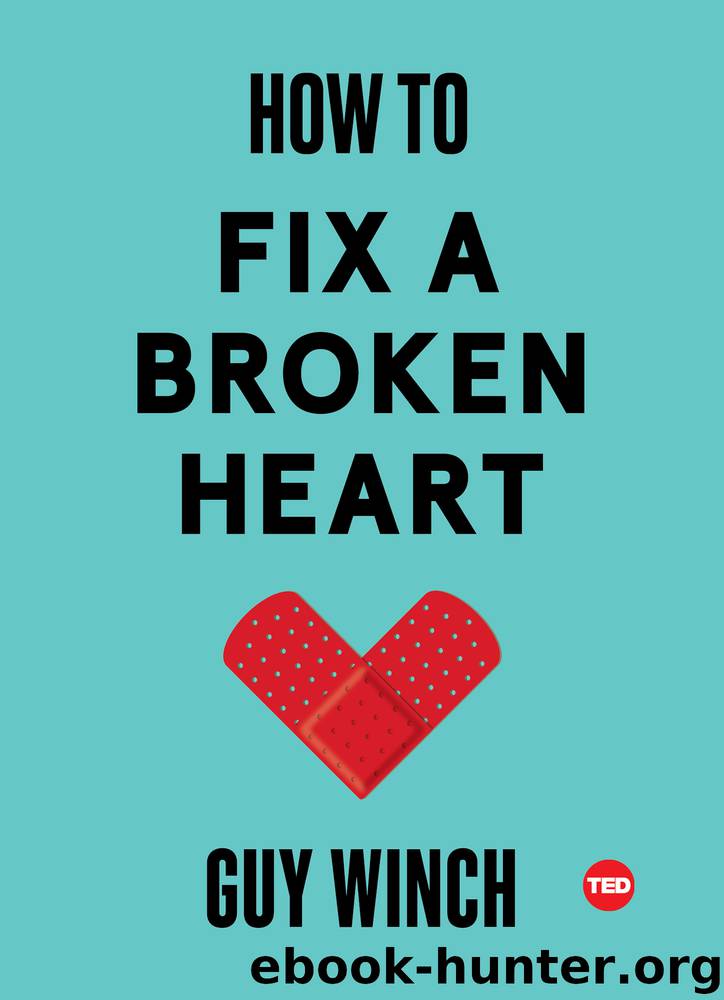How to Fix a Broken Heart by Guy Winch

Author:Guy Winch
Language: eng
Format: epub
Publisher: Simon & Schuster/ TED
The Dangers of Assuming We Are to Blame
The psychological damage Kathy unwittingly inflicted on herself extended far beyond the mere delay of her recovery. By assuming she was somehow to blame for the demise of the relationship, she was keeping herself stuck in debilitating feelings of loss. When feelings of grief do not ease after six months, it can be a sign that we have developed an abnormal response to loss and heartbreak known as complicated grief.
Studies of complicated grief (sometimes called persistent complex bereavement disorder) have illuminated the crucial and damaging role of negative cognitions. Negative cognitions are inaccurate thoughts or beliefs that make us feel bad about ourselves and prevent us from resuming our lives in a productive way. Psychologically speaking, negative cognitions have three key features: they are self-critical, harmful or limiting; they are inaccurate to some degree (and often significantly so); and most problematic, we tend to be convinced they are true. In fact, in many cases, the thought of questioning the veracity or validity of a negative cognition never even crosses our mind. We just think of them as factual.
Negative cognitions are by no means unusual as it is not uncommon to harbor a few, even if in mild forms. Such erroneous beliefs usually exist side by side with feelings of low self-esteem, depression, anxiety, and of course, heartbreak and grief. Many forms of psychotherapy involve identifying and challenging the patient’s negative cognitions as doing so is a proven and highly effective therapeutic technique. There are many forms of negative cognitions. Some tend to be far more damaging than others and put us at risk for developing complicated grief. One of these is excessive self-blame.
Kathy believed she had made a critical mistake, one that led to the end of the relationship. She was entirely unaware that this assumption was completely false and therefore, she had no recognition of the extent to which it sabotaged her ability to move through the grieving process or how it increased her risk of developing both depression and anxiety.
Self-blame is equally common and just as damaging when we lose a cherished pet. We might chastise ourselves for not realizing sooner that something was wrong, for leaving the cage or window open, for failing to close the gate to the yard, for not anticipating traffic on a quiet street, for not holding their leash tight enough, for not realizing they had eaten something harmful, for not being there for their final moments, or for not appreciating them enough when they were alive.
Download
This site does not store any files on its server. We only index and link to content provided by other sites. Please contact the content providers to delete copyright contents if any and email us, we'll remove relevant links or contents immediately.
Should I Stay or Should I Go? by Ramani Durvasula(7639)
The Lost Art of Listening by Michael P. Nichols(7476)
The Rosie Project by Graeme Simsion(6353)
Beartown by Fredrik Backman(5716)
We Need to Talk by Celeste Headlee(5596)
Ego Is the Enemy by Ryan Holiday(5391)
Hunger by Roxane Gay(4909)
Suicide Notes by Michael Thomas Ford(4807)
I Love You But I Don't Trust You by Mira Kirshenbaum(3855)
Mummy Knew by Lisa James(3670)
Not a Diet Book by James Smith(3394)
Crazy Is My Superpower by A.J. Mendez Brooks(3377)
Girl, Wash Your Face by Rachel Hollis(3270)
Toxic Parents by Susan Forward(3269)
The Complete Idiot's Guide to Coping With Difficult People by Arlene Uhl(3135)
The Social Psychology of Inequality by Unknown(3008)
Name Book, The: Over 10,000 Names--Their Meanings, Origins, and Spiritual Significance by Astoria Dorothy(2962)
The Hard Questions by Susan Piver(2959)
The Gaslight Effect by Dr. Robin Stern(2776)
